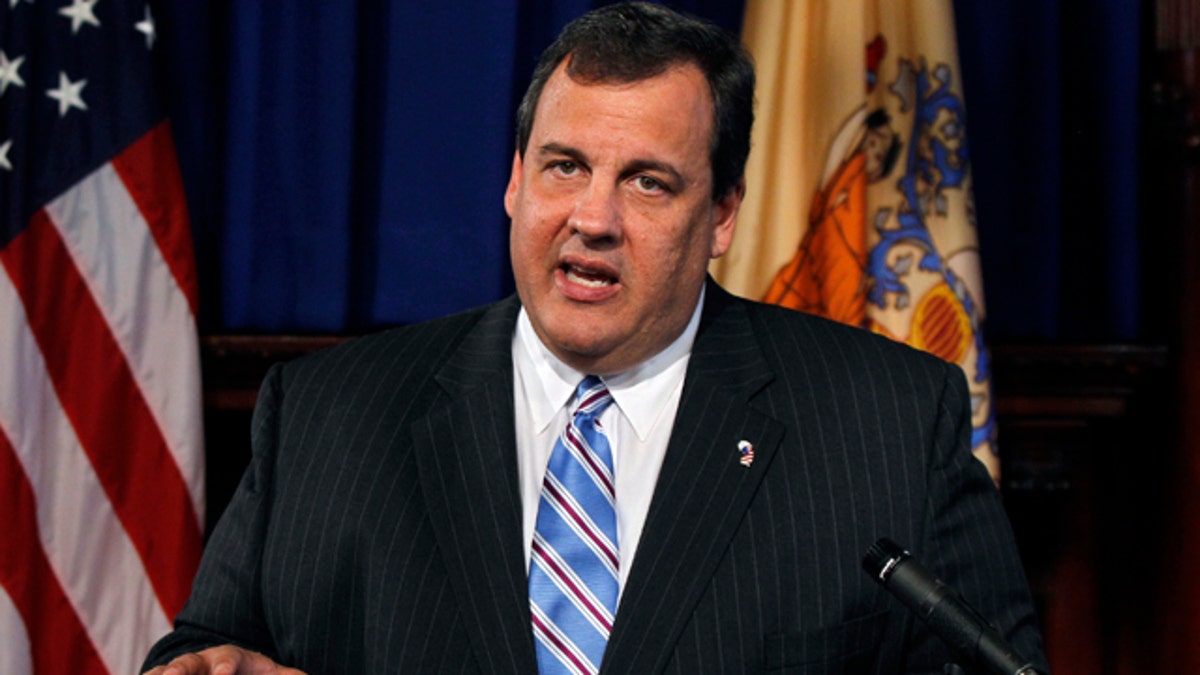
FILE: New Jersey Gov. Chris Christie (AP)
TRENTON, N.J. -- New Jersey Gov. Chris Christie on Tuesday signed landmark legislation that increases pension and health contributions paid by a half-million teachers, police and other public workers and removes the issue from collective bargaining for four years.
Christie said public employee benefits have been more generous than the state can afford and need to be scaled back. The latest actuary figures show the pension and health care systems $110 billion short of their eventual liabilities.
The Republican governor said the legislation achieves two main goals: helping New Jersey taxpayers and ensuring that health and retirement benefits are still secure for public workers in future years.
"New Jersey has become a model for America," Christie said.
"Not only does this save at least $132 billion over the next 30 years for the taxpayers of New Jersey," he said, "just as importantly is an assurance to the hardworking men and women in government all across New Jersey that when the time comes for them to retire, their pension will be there for them to collect and the health insurance they will need to help them during their retirement years will be there and affordable for them as well."
He said taxpayers -- already paying an average of $7,576 in property taxes, the highest in the nation -- could begin to see relief when municipal levies are billed in August 2012.
The legislation fractured the state's Democratic Party.
The law evokes sweeping changes affecting current and future workers and retirees. Current workers will be assessed a portion of their health care premiums based on how much they earn and will see their pension contributions rise by at least 1 percent immediately. Future hires will have to work until they are 65, not 62, before retiring and will have to pay for health care in retirement, unlike retirees now. Workers already collecting a pension will see a suspension in their cost-of-living adjustments.
Employees who earn $60,000 and now pay $900 (1.5 percent of salary) toward health insurance will see their yearly costs more than double to $2,056 (3.4 percent of salary) for single coverage or more than triple $3,230 (5.4 percent of salary) for a family plan, after a four-year phase-in.
That amounts to 27 percent of the premium cost for single coverage and 17 percent for family coverage.
A Kaiser Family Foundation survey last year found that workers with employer-sponsored health plans paid 19 percent of the premium on average for single coverage and 30 percent for family coverage. State and local government workers paid the lowest percentage of their premiums -- an average of 9 percent for single coverage and 25 percent for a family plan, according to the survey.
Public worker unions fought the changes and lost. A majority of Democrats in both houses of the Legislature bucked party leaders and opposed the plan. But it was muscled through with support from minority Republicans and a few Democrats after Christie struck a deal with legislative leaders of both parties.
A leading opponent, Assembly Majority Leader Joe Cryan, said Christie divided Democrats and weakened unions to achieve his goal.
"Crushing collective bargaining was the culmination of a premeditated crusade pitting neighbor against neighbor in an effort to drive a conservative agenda that would appeal to even the most ardent national Republicans," Cryan said. "Mission accomplished."
Christie said he anticipates legal challenges to the legislation.
Other states have been seeking to force public employees to pay more for benefits and limit collective bargaining rights. A GOP-led effort in Wisconsin calls for public workers to pay more for health and pension benefits beginning in late August unless a lawsuit by a coalition of unions is successful.
In Ohio, Gov. John Kasich in March signed a law limiting bargaining rights, which has yet to go into effect. In Michigan, the Republican state Senate has passed measures to require most public employees to cover at least 20 percent of the cost of buying their health insurance coverage, with some flexibility for local bargaining units.
The Massachusetts House passed a bill in late April stripping public-sector unions of the right to bargain over health care.
Christie said other states could learn from New Jersey's bipartisan cooperation to get similar legislation passed and from the creation of employer-employee pension management boards to oversee the public-sector retirement funds.












































